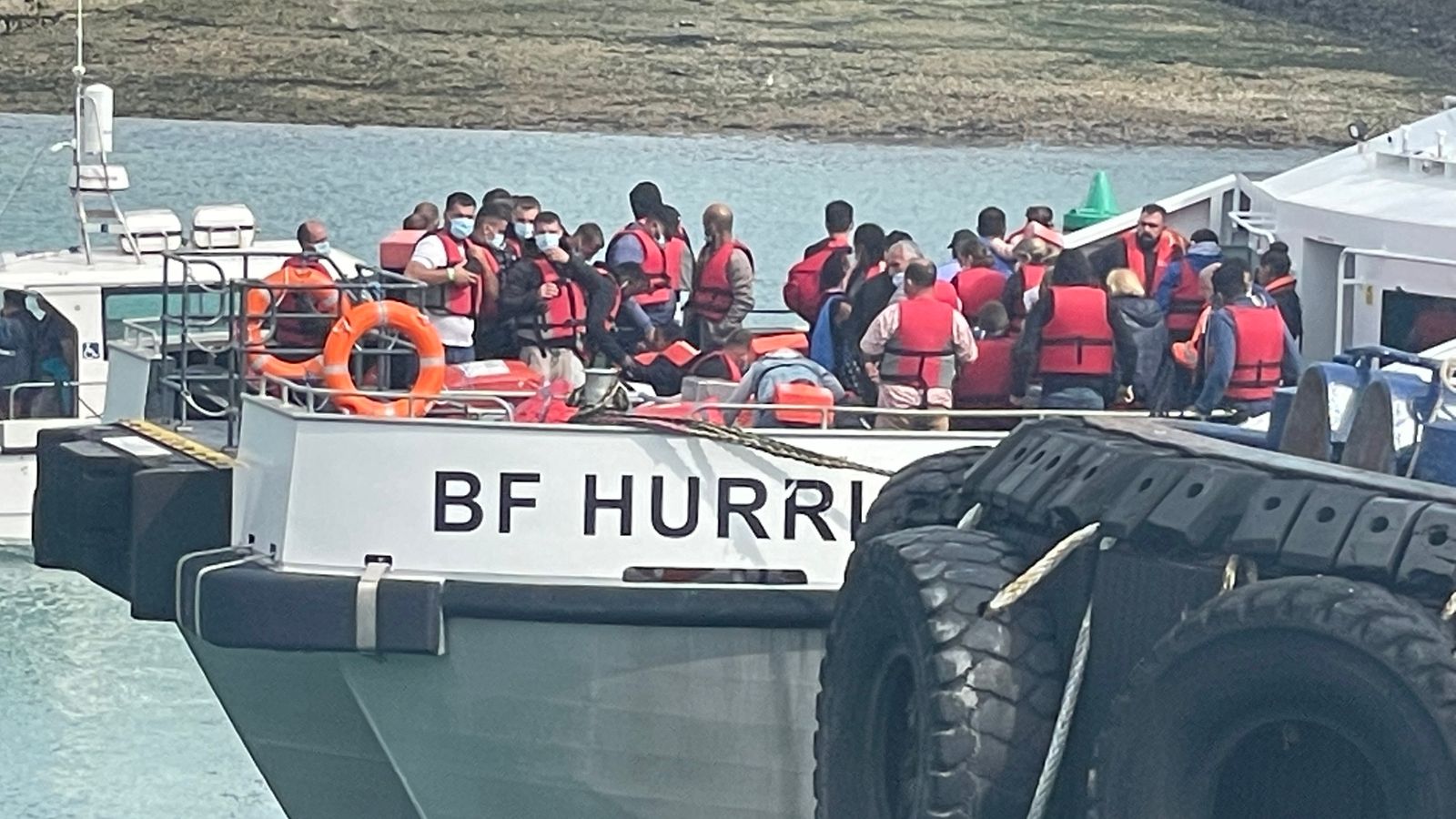The amount of Albanian migrants crossing the Channel has seen an “exponential rise” over the last year, MPs have heard.
The Home Affairs Committee was told that “one to two percent” of the entire male population of Albania – around 10,000 men – arrived on small boats this year alone.
MPs were also told that the Home Office has only processed 4% of asylum applications made by migrants who crossed the Channel last year, with the cost of housing those awaiting a claim rising to almost £5.6m a day.
It comes amid a row over the appointment of Home Secretary Suella Braverman to Rishi Sunak’s cabinet.
MPs on the Home Affairs Committee had been due to hear from immigration minister Tom Pursglove, but his appearance was cancelled after he lost his job in Tuesday’s reshuffle.
Instead, a number of officials presented MPs with “stark figures” that at times led to audible gasps in the committee room.
MPs learned that more than 38,000 people have arrived in the UK after crossing the Channel in over 900 boats in 2022 to date, compared with 28,526 last year.
Ministers can keep some internal documents on Rwanda immigration policy secret, High Court rules
Small boat pilots crossing Channel with migrants to face life in prison, says Home Office
Rwanda flight cancelled: Priti Patel criticises European Court of Human Rights as deportations challenged
Around 93% of those arrivals have claimed asylum – but there is a 100,000 backlog in processing claims, with 96% of applications from 2021 still outstanding.
Of the 4% completed, 85% were granted refugee status or another protection status.
Dan Hobbs, director of asylum, protection and enforcement, said there is a “challenge in processing asylum claims in a timely way at present”.
But Tim Loughton, the Conservative MP for East Worthing and Shoreham, branded the figures “ridiculous”, adding: “A vast number are not knowing if they are going to be accepted or not, and residing in the UK at the taxpayers’ expense, challenge is not the half of it.”
Please use Chrome browser for a more accessible video player
Cost of housing asylum seekers almost £7m a day
During the wide-ranging session, MPs heard that the government is now spending almost £7m a day housing asylum seekers in hotels and the cost could continue to rise.
The committee was told £5.6m a day was being spent on hotels for people who have arrived in the UK and have submitted a claim, with an additional £1.2m paid to house Afghan refugees who fled the Taliban takeover while long-term accommodation is sought.
Concerns were also raised about conditions at the Manston processing centre in Kent, which has recently been hit by a small outbreak of diphtheria.
‘Wretched conditions’ at processing centre
The centre was designed to hold up to 1,600 people short-term, but there are currently around 3,000 there – more than the population of any UK prison.
MPs heard the number of people arriving was “outstripping” the capacity of the site and many are held longer than the 24 hours intended – with some held there for over a month.
David Neal, the Independent Chief Inspector of Borders wrote to the Home Secretary on Monday after he saw “pretty wretched” conditions during a visit – with 2,800 people being guarded by non-trained detainee custody officers.
He said: “When I discovered that, I was frankly speechless and I am not someone who is normally speechless.”
He said the centre was “past the point” that it can be safe and run properly and accused the Home Office of a “creeping lack of ambition”.
Click to subscribe to the Sky News Daily wherever you get your podcasts
Surge in illegal migration from Albania
Dan O’Mahoney – the Home Office’s clandestine Channel threat commander – also noted that there was a surge in illegal migration from Albania.
He said the influx of people arriving on UK shores was “50 – 50 an asylum problem and an illegal migration problem” – saying there had been a “very significant increase” in adult single men arriving from Albania.
He told MPs: “Two years ago, 50 Albanians arrived in the UK in small boats, last year it was 800 and this year so far it’s been 12,000 of which about 10,000 are single adult men. So the rise has been exponential.”
He said the main reason for the rise is that Albanian criminal gangs appear to have gained a “foothold” in northern France and are facilitating the small boat crossings.
He said to put the figures from this year into context, it is “between one and two percent of the entire male population of Albania”.
While some of these people will claim asylum or may be victims of modern slavery, others are “deliberately gaming the system” – and will disappear into the UK on arrival.
He said. “There is a huge amount of very harmful serious and organised criminality in the UK committed by Albanian criminal gangs.
“Whatever serious criminality you can think of, there are Albanian criminal gangs who are dominating: Drug smuggling, human trafficking, guns, prostitution.”
He added: “A lot of the Albanian migrants we see at the moment are coming into the UK in small boats because it’s a very successful way of getting here. Some of course need our help but the asylum grant rate for single Albanian men is quite low.
“Typically they may choose not to claim asylum, they will get put in a hotel for a few days and then disappear.
“They are able to do that because the way the asylum system works and the way the NRM (the referral mechanism for modern slavery) works makes it easy to do so “
Read More:
Albanian police could be brought to UK to help stop Channel crossings
‘Unsustainable’ pressure on RNLI to rescue people crossing Channel
During the session, officials also admitted that the interception rate made by French police of migrants attempting the crossing had fallen, from about 50% to 42.5%.
However, Mr O’Mahoney praised French authorities, saying they had stopped 28,000 attempts of migrant crossings and intercepted and destroyed 1,072 boats so far this year.
“I should put on record my thanks to the French… this is around double what they managed to achieve last year, so that is really, really significant,” Mr O’Mahoney said.
Despite tensions between the UK and France over the issue, he later added: “Co-operation between France and the UK is the best that it has been in my two years in the role.”







